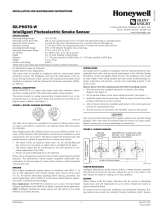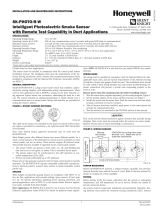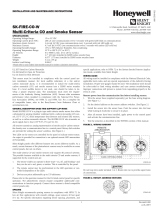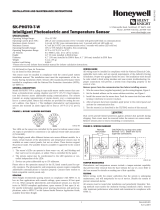Page is loading ...

D200-72-00 1 I56-1184-04R
FTX-P1 Filtrex
®
Intelligent
Photoelectronic Smoke Detector
INSTALLATION AND MAINTENANCE INSTRUCTIONS
A Division of Pittway
3825 Ohio Avenue, St. Charles, Illinois 60174
1-800-SENSOR2, FAX: 630-377-6495
Before Installing
This detector must be installed in compliance with the
control panel system installation manual. The installation
must meet the requirements of the Authority Having Juris-
diction (AHJ). Detectors offer maximum performance
when installed in compliance with the National Fire Pro-
tection Association (NFPA); see NFPA 72.
General Description
Filtrex® uses a small air intake fan and a high density re-
placeable filter. Air and smoke are drawn into a photoelec-
tric sensing chamber while airborne particulate and water
mist are removed. The addressable-analog detector trans-
mits an analog representation of smoke density over a com-
munication line to a control panel. Rotary-decade switches
are provided for setting the sensor’s address. Two LEDs on
the sensor are controlled by the panel to indicate sensor
status.
Filtrex smoke detector is intended for use in normal en-
vironmental conditions, where dust and other airborne
particulate are present at elevated levels. These elevated
levels tend to cause false alarms and high maintenance
in standard detectors. Filtrex provides a protective enclo-
sure for a photoelectric smoke detector chamber and al-
lows smoke detection in areas that tended to use
exclusively heat detection.
Filtrex requires compatible addressable communications
to function properly. Connect this detector to listed-com-
patible control panels only.
Spacing
System Sensor recommends spacing detectors in compli-
ance with NFPA 72. In low air flow applications with
smooth ceilings, space detectors 30 feet apart. For specific
information regarding sensor spacing, placement, and spe-
cial applications, refer to NFPA 72 or the System Sensor
Guide For Proper Use of System Smoke Detectors, available
from System Sensor (P/N I56-407-XX).
WARNING
Filtrex is not designed to operate in explosive environments.
Specifications
Operating Voltage Range: 15 to 32 VDC
Detector Current: 230
µ
A @ 24 VDC (without communication)
285
µ
A @ 24 VDC (one communication every 5 sec. with LED enabled)
Auxiliary Power Supply Voltage: 15 to 30 VDC filtered; Ripple voltage may not drop below 15 volts.
Auxilary Power Supply Current –
Peak: 123 mA max.
Average: 27 mA max.
Operating Humidity Range: 10% to 93% Relative Humidity, noncondensing
Operating Temperature Range: 0° to 50°C (32° to 122°F)
Height: 2.8 inches (43 mm)
Diameter: 6.1 inches (155 mm) installed in B501B-FTX
4.0 inches (102 mm) installed in B524FTXE
Weight: 7.3 oz. (207 g)
Compatibility: Backwards compatible with 200 and 500 series products’ protocol
Mounting Base: Requires B501B-FTX (U.S.), B524FTXE (Europe)

D200-72-00 2 I56-1184-04R
Wiring Instructions
All wiring must be installed in compliance with the Na-
tional Electrical Code, applicable local codes, and any spe-
cial requirements of the Authority Having Jurisdiction.
Proper wire gauges should be used. The installation wires
should be color-coded to limit wiring mistakes and ease
system troubleshooting. Improper connections will prevent
a system from responding properly in the event of a fire.
Remove power from the communication line before in-
stalling detectors.
All wiring must conform to applicable local codes, ordi-
nances, and regulations.
1. Wire the sensor base per the wiring diagram, please see
Figure 1.
2. Set the desired address on the sensor address switches,
please see Figure 2.
3. Insert 5-wire connector on mounting base into 5-pin
connector on Filtrex unit. Install the detector into the
sensor base. Push the detector into the base while turn-
ing it clockwise to secure it in place. (Please see Figure
5 and INSTALLING FILTREX INTO BASE on page 4 for
specific directions.
4. After all detectors have been installed, turn on the auxil-
iary power supply, then apply power to the control unit
and activate the communication line.
5. Test the detector(s) as described in the TESTING section
of this manual.
CAUTION
Dust cover must be removed before the detector can sense
smoke.
LISTED COMPATIBLE CONTROL PANEL
AUX.
POWER
SUPPLY
+
+
–
–
AUX+
AUX–
AUX+
AUX–
2(–)
3(RA)
4(S)
1(+)
1(+)
2(–)
3(RA)
4(S)
Testing
Before testing, notify the proper authorities that the system
is undergoing maintenance, and will temporarily be out of
service. Disable the system to prevent unwanted alarms.
All detectors must be tested after installation and periodi-
cally thereafter. Testing methods must satisfy the Authority
Having Jurisdiction (AHJ). Detectors offer maximum per-
formance when tested and maintained in compliance with
NFPA 72.
The sensor can be tested in the following ways:
A.
Functional: Magnet Test (P/N M02-04-01 or M02-09-00)
This detector can be functionally tested with a test mag-
net. The test magnet electronically simulates smoke in
the sensing chamber, testing the detector electronics and
connections to the control panel.
1. Hold the test magnet in the magnet test area as shown
in Figure 3.
2. The detector should alarm the panel. Two LEDs on
the detector are controlled by the panel to indicate
sensor status. Coded signals, transmitted from the
panel, can cause the LEDs to blink, latch on, or latch
off. Refer to the control panel technical documenta-
tion for detector LED status operation and expected
delay to alarm.
B. Smoke Entry: Aerosol Generator
Aerosol generators for smoke entry testing are available
from a number of third party manufacturers (e.g.,
Gemini Scientific). Following the manufacturer’s instruc-
tions, apply aerosol until the panel alarms.
A detector that fails any of these tests should be retested. If
Figure 1. Wiring diagram:

D200-72-00 3 I56-1184-04R
TEST MAGNET
MARKER
Cover is keyed to
fit into 4 matching
size slots.
4
5
6
3
7
8
2
1
9
0
4
5
6
3
7
8
2
1
9
0
A78-2460-00
Figure 2. Rotary decade address switches:
Figure 3. Test magnet position:
Figure 4. Replacing the filter cover:
the detector still fails any test, have its filter replaced (see in-
structions below) and retested. Finally, if the detector contin-
ues to fail after replacing the filter, it must be returned for
repair or replacement.
When testing is complete, restore the system to normal op-
eration and notify the proper authorities that the system is
back in operation.
Cleaning
The unique design of Filtrex eliminates the need for typical
detector cleaning. The only maintenance necessary is re-
placing the filter, which is signaled by a trouble condition
at the panel (see below).
Filtrex has been designed to maximize the amount of time
before maintenance is required. Filtrex utilizes a replaceable
filter that may become clogged over time. Filtrex monitors
itself to insure that the filter has not become clogged. Be-
cause environmental conditions can vary significantly, the
amount of time before maintenance could vary significantly
as well. To fully understand the maintenance requirements
of Filtrex in its installed location, it is recommended that the
following test program be conducted.
1. Install Filtrex in the desired location.
2. Connect Filtrex to the fire alarm control panel.
3. Maintain a record for at least 90 days of any mainte-
nance performed on or required by Filtrex.
4. At the end of the test period, use the record to develop
and schedule maintenance. Filtrex detectors should be
serviced at regular intervals to insure that the fire alarm
system provides continuous protection.
Replacing the Filter
IMPORTANT:
When the filter becomes too clogged to draw ad-
equate air into Filtrex, power is automatically cut
from the detector, sending a trouble signal to the
fire control panel. After 5 minutes, power is re-
stored to the detector for 72 hours. After 72 hours,
power is cut again and the detector will remain off-
line until the filter is replaced.
Note: The unit has two filters. The replaceable filter is in-
side the cover. A permanent filter is mounted to the unit.
1. Grasp the Filtrex housing with one hand and the cover
with the other. Turn the cover counterclockwise fully
(approx. 30 degrees) and remove cover by pulling it
away from detector unit (see Figure 4).
2.Replace with new filter and cover assembly. The cover is
keyed so it fits in place only one way. Turn the cover
clockwise until it stops.
NOTE: The base is equipped with an optional tamperproof
feature which can be used to prevent unintentional removal
of Filtrex while replacing the filter.
Alignment marks are
provided on the cap
and top of the
permanent filter.

D200-72-00 4 I56-1184-04R
©
2000 System Sensor
Three-Year Limited Warranty
System Sensor warrants its enclosed smoke detector to be free from de-
fects in materials and workmanship under normal use and service for a
period of three years from date of manufacture. System Sensor makes no
other express warranty for this smoke detector. No agent, representative,
dealer, or employee of the Company has the authority to increase or alter
the obligations or limitations of this Warranty. The Company’s obligation
of this Warranty shall be limited to the repair or replacement of any part of
the smoke detector which is found to be defective in materials or work-
manship under normal use and service during the three year period com-
mencing with the date of manufacture. After phoning System Sensor’s toll
free number 800-SENSOR2 (736-7672) for a Return Authorization number,
send defective units postage prepaid to: System Sensor, Repair Depart-
ment, RA #__________, 3825 Ohio Avenue, St. Charles, IL 60174. Please
include a note describing the malfunction and suspected cause of failure.
The Company shall not be obligated to repair or replace units which are
found to be defective because of damage, unreasonable use, modifica-
tions, or alterations occurring after the date of manufacture. In no case
shall the Company be liable for any consequential or incidental damages
for breach of this or any other Warranty, expressed or implied whatsoever,
even if the loss or damage is caused by the Company’s negligence or fault.
Some states do not allow the exclusion or limitation of incidental or conse-
quential damages, so the above limitation or exclusion may not apply to
you. This Warranty gives you specific legal rights, and you may also have
other rights which vary from state to state.
Figure 5: Installing Filtrex detector into base:If a clogged filter was the cause of the trouble condition,
normal detector operation should resume automatically
within five minutes. If the trouble condition persists, the
detector must be returned for repair or replacement.
Installing Filtrex Into Base
1. Align the detector at a right angle to the base, with the
five wires and connector adjacent to the connector re-
ceptacle as shown in Figure 5.
2. Plug the wired connector into the receptacle.
3. Rotate the detector into the base, making sure detector
and base keyed fit is lined up. Turn the detector clock-
wise until it snaps into place.
IMPORTANT: Filtrex will only operate with B501B-FTX/
B524FTXE Mounting Base.
FCC Statement
This device complies with part 15 of the FCC Rules. Operation is subject to the following two conditions: (1) This device may not cause harmful interfer-
ence, and (2) this device must accept any interference received, including interference that may cause undesired operation.
Note: This equipment has been tested and found to comply with the limits for a Class B digital device, pursuant to Part 15 of the FCC Rules. These limits
are designed to provide reasonable protection against harmful interference in a residential installation. This equipment generates, uses and can
radiate radio frequency energy and, if not installed and used in accordance with the instructions, may cause harmful interference to radio commu-
nications. However, there is no guarantee that interference will not occur in a particular installation. If this equipment does cause harmful interfer-
ence to radio or television reception, which can be determined by turning the equipment off and on, the user is encouraged to try to correct the
interference by one or more of the following measures:
– Reorient or relocate the receiving antenna.
– Increase the separation between the equipment and receiver.
– Connect the equipment into an outlet on a circuit different from that to which the receiver is connected.
– Consult the dealer or an experienced radio/TV technician for help.
Please refer to insert for the Limitations of Fire Alarm Systems
/




